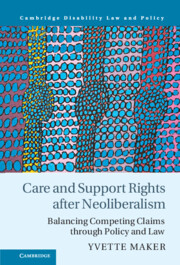Book contents
- Care and Support Rights after Neoliberalism
- Cambridge Disability Law and Policy Series
- Care and Support Rights after Neoliberalism
- Copyright page
- Contents
- Table
- Foreword
- Acknowledgments
- Abbreviations
- Introduction
- Part I Care Policy Tensions
- Part II Balancing Competing Claims through Rights-Based Policy and Law
- Part III Care and Support Policy Tensions in Two Liberal Welfare States
- 6 Income Support for Carers of Children with Disabilities in Australia
- 7 Care, Disability and Gender Equality in Australian Carers’ Income Support
- 8 Incorporating Multiple Options and Perspectives
- 9 Care and Support for Adults in England
- 10 Care, Disability and Gender Equality in English Care and Support Policy
- 11 Maximizing Options and Opportunities
- Conclusion
- Index
- Other Books in the Series
11 - Maximizing Options and Opportunities
Aligning the Care Act with the Care and Support Rights Principles
from Part III - Care and Support Policy Tensions in Two Liberal Welfare States
Published online by Cambridge University Press: 21 April 2022
- Care and Support Rights after Neoliberalism
- Cambridge Disability Law and Policy Series
- Care and Support Rights after Neoliberalism
- Copyright page
- Contents
- Table
- Foreword
- Acknowledgments
- Abbreviations
- Introduction
- Part I Care Policy Tensions
- Part II Balancing Competing Claims through Rights-Based Policy and Law
- Part III Care and Support Policy Tensions in Two Liberal Welfare States
- 6 Income Support for Carers of Children with Disabilities in Australia
- 7 Care, Disability and Gender Equality in Australian Carers’ Income Support
- 8 Incorporating Multiple Options and Perspectives
- 9 Care and Support for Adults in England
- 10 Care, Disability and Gender Equality in English Care and Support Policy
- 11 Maximizing Options and Opportunities
- Conclusion
- Index
- Other Books in the Series
Summary
The English Care Act recognizes the possibility that carers may be both unpaid carers and paid workers. It also recognizes both care and support users and carers as potential rights-holders on the basis of their needs and/or responsibilities and partly contemplates that people may be in both roles at the same time. While its gaps and limitations mean many people cannot access rights-based support, these policy features do offer a scaffolding for developing a policy that aligns with the six principles proposed in this book. This chapter sketches the reforms that would be necessary to overcome the limitations of the policy in terms of its inadequate support for unpaid care and paid work, lack of recognition of the gender division of labor and inadequate responses to the claims of carers and people with disabilities. These include removing the ‘hard’ eligibility threshold and introducing greater flexibility and user control in assessment and eligibility determinations; ensuring that budgets are sufficient to ensure decent pay and conditions for paid workers; and revising the definition of ‘well-being’ to ensure that the policy captures human rights considerations and all of the matters care and support users and carers consider to be important.
Keywords
- Type
- Chapter
- Information
- Care and Support Rights After NeoliberalismBalancing Competing Claims Through Policy and Law, pp. 246 - 280Publisher: Cambridge University PressPrint publication year: 2022



